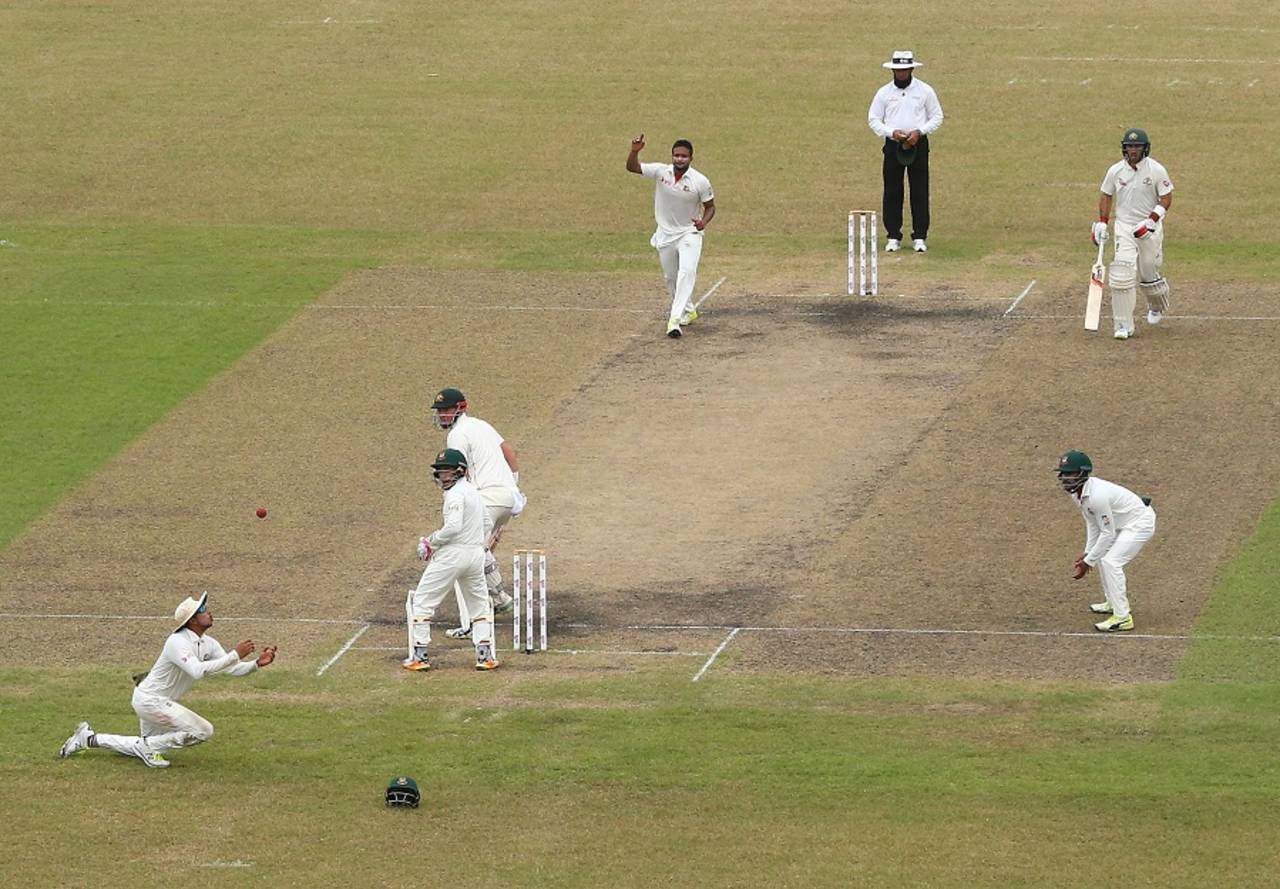Australia didn't lose to Bangladesh because of the pay war
They lost primarily because they hadn't played any competitive games ahead of the tour
Ian Chappell
Sep 3, 2017, 2:30 AM

The cancellation of their warm-up game in Fatullah hurt Australia • Getty Images
Not surprisingly, Australia struggled and eventually lost to a Bangladesh side that has lately shown marked improvement after many years of stagnation.
It wasn't so much Australia's renowned reputation for ineptitude against good spin bowling in Asian conditions or even the players' prolonged dispute with Cricket Australia in the lead up to the tour that made the loss almost inevitable. Even though international cricketers are fully professional and play nearly all year round, Australia's failure was more to do with not having played any competitive cricket ahead of the Test series.
Not only did some Australian players miss out on competitive matches when an A tour to South Africa was cancelled due to the dispute with CA, the team was also then denied a warm-up game in Bangladesh because the ground was flooded.
Some might point to the Indian team and suggest that as a strong cricket nation they had no trouble annihilating Sri Lanka in a three-Test series with only the benefit of a leisurely two-day warm-up game. True, but the Indian players were involved in the IPL in the lead-up, and playing matches that count makes a huge difference.
All the nets in the world don't make up for a lack of match practice before a testing series. It's a common refrain among cricketers. You don't make runs or take wickets in the nets. More importantly as a batsman, being dismissed in the nets doesn't count against your record.
Steven Smith's Australians did have an intra-squad practice match in Darwin before they departed for Bangladesh. Nevertheless such a match is of minimal help. Once again, the results don't go against a player's record.
All the nets in the world don't make up for a lack of match practice before a testing series
I discovered the fallibility of intra-squad matches in 1975 when the Australian team had one in London in preparation for the inaugural World Cup. I captained a team that was strong in bowling but light on batting. Chasing a solid score by the team led by Greg Chappell, we were quickly in trouble when the medium-pace offerings of Doug Walters threatened to make a mockery of the game.
When Walters upstaged Dennis Lillee - the leader of Australia's attack - by taking three wickets in the opening overs, I intervened. I told opening batsman Bruce Laird, who had already been dismissed by Walters, to pad up and go in again as this was supposed to be practice.
Upon Laird's second arrival in the middle to confront Walters, the smart-alec bowler responded with: "Excuse me batsman, haven't I seen you somewhere before?"
The reprieve didn't help Laird, as he was dismissed first ball, and I then returned to the crease to face a Walters hat-trick. So much for a contest - Walters took 5 for 12 and ruined any hope of it being valuable match practice.
For a batsman, a decent score - whether it be at club or first-class level - prior to an international series is crucial. As long as it's in a match that counts, the runs confirm that the feet are moving well, concentration is honed, and consequently, the batsman's confidence is high. Likewise, for a bowler a bag of wickets tells him his rhythm is good, the ball is coming out of the hand well and again, his confidence is boosted. With success achieved, both batsman and bowler feel well prepared for what lies ahead.
Bangladesh's achievement shouldn't be devalued. It adds another major scalp to their record and confirms they are finally attaining a level of competitiveness against the top sides. However, Bangladesh shouldn't relax, since a wounded Australian side is a dangerous opponent. They will definitely be better for having played a game - albeit one they lost - that counted.
Australia will also be keen for an improved showing in order to prove they are ready for the looming Ashes series. On the other hand, England will be desperate to avenge their shock loss to West Indies. Nothing like a bit of competitiveness in the preparation to add spice to the upcoming Ashes series.
Former Australia captain Ian Chappell is a cricket commentator for Channel Nine, and a columnist